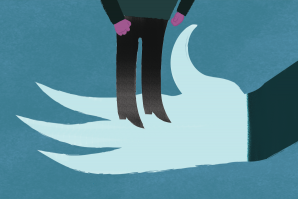Carrie Clark, 63, says bullies aren’t confined to playgrounds. Sometimes, they run the whole school.
In 1995, Clark directed an English as a Second Language program in West Sacramento’s Washington Unified School District. An influx of foreign students was forcing her staff to work ever-longer hours. She wrote several reports to the district superintendent documenting the extra load and asking for more help. She got no response, she says. So her teachers union representative suggested she put together a petition signed by program staff.
That got a reaction, but not the one she wanted. The superintendent took Clark off of the school’s committee of department chairs and canceled and consolidated classes. Clark says he called her house and left an odd, garbled message, and one day after a meeting, he followed her into an empty hallway. Towering over her, his face a foot from hers, he screamed that he wanted “no more petitions!”
Scared, Clark quit a few weeks later. She developed tremors in her right side, which she still has, started having heart palpitations and couldn’t sleep. Today, when she talks about what happened, her speech slows to a crawl and her voice quavers like a warped record. A Sacramento occupational medicine specialist diagnosed her with a post-traumatic stress disorder related to her job. After a 20-year teaching career, she’d never set foot in a classroom again. In 2002, she won a $150,000 workers’ compensation claim against the district.
There’s evidence that the superintendent targeted others who crossed him. He took a job in a district near Yuba City, and in January 1999 the teachers association president there told The Valley Mirror that the superintendent verbally threatened her and that she’d asked a court for a restraining order. She also told a reporter that she was having panic attacks for the first time in her life. (The superintendent, now retired, keeps an unlisted phone number and didn’t respond to a certified letter sent to his address requesting an interview.)
No state offers workers legal protections against intimidation on the job, but advocates around the country have turned up the heat and are demanding new laws. But critics say legislation would stifle managers and open the floodgates to lawsuits. All sides agree that if businesses ignore the issue, new legislation could well force them to change.
The Push for a Healthy Workplace
Bullies do more than demand that work get done. They threaten, humiliate or intimidate for reasons unrelated to job performance. The Society for Human Resource Management, which represents human resource professionals nationally, describes workplace bullying as a pattern of behaviors that include persistently singling out someone for criticism, shouting in private or public, slinging personal insults, ignoring or interrupting people in meetings or assigning menial tasks that aren’t part of an employee’s normal responsibilities.
If recent polls are any guide, many organizations tolerate such behaviors. In a 2011 SHRM survey of 400 randomly selected human resource professionals, more than a quarter reported having been bullied themselves at work, 73 percent said they’d seen verbal abuse on the job and 5 percent said they’d seen physical assaults. In a Zogby poll that last year asked 1,000 randomly selected people whether they’d ever experienced a pattern of “abusive conduct” at work, more than a quarter said they had. Another Zogby poll of 315 U.S. business leaders in 2013 reported that 170 of them identified workplace bullying as “a serious problem.” Both polls were commissioned by the nonprofit Workplace Bullying Institute, which trains organizations and in 2011 began a campaign to promote anti-bullying laws nationwide. Their proposed Healthy Workplace Bill was first introducted in California in 2003.
Related: How To Make an Anti-Bullying Policy Work
Bullying hurts businesses and workers alike. Companies with ruffians have higher absenteeism and turnover, decreased morale, diminished trust among coworkers and lower productivity, according to a host of studies. Workers who are targeted experience a range of negative health outcomes, including sleeping problems, emotional exhaustion, PTSD, hypertension and autoimmune disorders. Most targets end up leaving their jobs; WBI research indicates that 80 percent end up quitting, getting fired or being transferred.
“Other forms of mistreatment, like child abuse and domestic violence, are societal taboos now,” says WBI founder Gary Namie, a social psychologist and author of two books on the topic. “This is the last form of abuse that society tolerates.”
As advocates have come forward to demand protection, workplace bullying has become the hottest area of employment law. Variations of the WBI’s Healthy Workplace Bill have been introduced in 28 states, though no legislature has yet enacted one. Such a bill would allow targets to sue perpetrators and, in some cases, their companies. At least 80 California cities and towns issued proclamations last October declaring a “Freedom From Workplace Bullies Week.” Several countries, including England, Sweden, Australia, France, Canada and Germany, already have laws banning workplace oppression.
Last September, California became the first state to require employers to train their workers on the problem. As of January, all companies with 50 or more employees must include information on preventing “abusive conduct” in their biannual sexual harassment trainings.
The new law, Assembly Bill 2053, offers no remedy to targeted employees, and Namie says it’s not a substitute for the Healthy Workplace Bill. But it could be an opening. Amelya Stevenson, president of human resource consulting firm e-VentExe in Granite Bay, is confident stronger state legislation will pass in a year or two.
Wiggle Words
Skeptics argue that trying to outlaw bullying won’t work. Michael Kalt, government affairs director for CalSHRM, the state SHRM chapter, doesn’t dispute the seriousness of the problem. But too much will be in the eyes of the beholder, he claims. “What if a boss yells at his employees when there’s a deadline? Some might consider that stern. What about micromanaging? Some would call that just great attention to detail. Can you discipline an employee for making mistakes?” Kalt asks.
Kalt concedes that none of those examples would be enough to subject an employer to a lawsuit under the Healthy Workplace Bill. The bill’s language exempts any action an employer takes as a result of documented poor performance or misconduct by an employee. Still, Kalt claims it would unleash a torrent of lawsuits.
Poll: Are Workplace Bullies a Real Thing?
“There are lots of wiggle words that could end up in legislation,” says Kalt. “And then we’ll spend years litigating what those mean.” Training like that required by AB 2053 will help employers change their work cultures, he argues.
But Stevenson says most companies aren’t paying attention to the issue. None of her clients have asked her to help them develop an anti-bullying policy. Employers are waiting for guidance from lawmakers on what needs to go into such a policy, she says: “When the law explains what managers can and can’t do, that will help HR managers [craft a policy]. That’s what tends to happen,” she says.
Getting Ahead of New Legislation
Kalt wants companies to go beyond AB 2053’s requirements to preempt a stronger law. At a minimum, businesses should be updating their codes of conduct to proscribe bullying and train supervisors on the new rules, he says. They also should create complaint procedures, ensure that employees know about them, and start disciplining offenders based on the new policy.
One manager has made stopping bullies a top priority in her organization. Ann Wrixon saw plenty of managers bully staff when she worked in Silicon Valley — it eventually drove her out of the tech field and into social work. She’s now executive director of the Concord-based non profit Independent Adoption Center.
In 2011, a few staff told her that malicious gossip was dividing her team. So she pulled together her top managers and with Namie’s help built an antibullying infrastructure. Today, a dedicated team handles only complaints about workplace abuse. If someone thinks they’re being targeted, they can talk in confidence to a team member who will approach the accused person to get their side.
If no resolution results, the team member sits with both parties to discuss solutions. If either still leaves unsatisfied, the case goes to a higher-level team member, who writes a report that goes to Wrixon for a decision about appropriate steps. During orientation, new staff get a one-on-one meeting with their managers to discuss the policy and the complaint process.
The center has had to use the new system for only one bullying case so far. The offender was reprimanded and later resigned. Wrixon thinks just having a policy and training program prevents malicious behavior from emerging in the first place. She also says the impacts on employee morale and the work atmosphere have been positive and dramatic — staff report being happier and are getting more done than before, with little or no gossip.
Of the managers she worked for in the tech field, she says, “They thought they got brilliant work out of their people, but I always thought they got brilliant work despite their bullying, not because of it.”
Recommended For You

Mind If I Push You Around?
Poll: Tell us your thoughts on bullying in the workplace
The Workplace Bullying Institute would like to see legislation put in place to protect employees from abusive coworkers or bosses. The California State Council for the Society for Human Resource Management says legislation would leave too much room for subjective analysis. What do you think?

Avoiding the Push Over
How to make an anti-bullying policy work
The Society for Human Resource Management has developed a model procedure for handling bullying complaints. Key language includes:

Catty Chatting
When you need to reprimand a digitally dubious employee
I manage a group of about 13 people, and we communicate via instant messages. I have one employee who persistently bad-mouthed me in online conversations. I confirmed that he was aware that I could see his messages, and I told him I saw messages that concerned me. Since then, he’s disengaged from his job and is only doing the bare minimum. I feel I should address this with him, but I’m unsure of how to do so.

Let Me Down Easy
7 tips for firing employees properly
Terminating an employee is never easy, and there are no guarantees that you won’t be slapped, but there are a few things you can do to make it easier on everyone.




Comments
My daughter's boss slapped her face, something no one in her life had done. After a session crying in the bathroom she went to human resources to report it. The HR response was, "What do you think we can do? He is the president!" She quit of course, but it was a well-paying job that she really needed.
I am so sorry to hear that.That is assault and should be reported to the police department.As I have read and experienced HR works for the company not the individual.I know this all to well...
I hate when people say "HR works for the company not the individual." Yes, at the end of the day, the company is who pays the salary. And, in some companies, HR's hands are tied because of the way management operates (I had that experience - the CEO was a bully as were others at the executive level). However, there are a lot of companies out there that want to provide a positive work environment and will not tolerate bullying, harassment, etc. In these companies, HR can be what they're supposed to be - an advocate for the staff as well as the company - and all employees are held accountable. Fortunately, I work for a company now that is like that. Employees who bring an issue to HR or a manager have their issue investigated and dealt with accordingly.
Management in my unit are all peace officers. I have never in my life have been subjected to the outrageous, double standard, arrogant, and abusive conduct as I am right now. There is no semblance of fairness in the playing field. When it comes to your rights this regime will do and say whatever they want ultimately denying you justice or the right To file a complaint.
My bully was a very powerful former dean in the School of Public Health at UCB. She was a serial bully that targeted individuals in the financial analyst position in her research unit. Her method was to overwork and underpay and to start fights among the staff--all the while being charming. But she went through at least 9 people that I know of in at least 15 years. The school did nothing to help, and most middle managers at Cal look the other way and are a part of the problem. The only reason I am being so open about this is that she has passed on (thankfully.) I was never able to get another job after working for her because she badmouthed me for 9 years after I quit. Even though I went on to get a PhD in organizational psychology, no one would hire me because of her. Bullies have a variety of tactics at their disposal and there is a range of behaviors. This is what makes the problem so pervasive and hard to solve.
I was bullied at the pharmacy America trusts. Walgreens knowingly hired a bipolar store manager . We were warned about his terrible moodiness. I became an instant target because I'm older. He preferred young women.
I was eventually forced to quit when the retaliation started after reporting the bully. Bullying does make a person sick. I hope Arizona takes a stand someday. Corporations are much too powerful to fight alone.